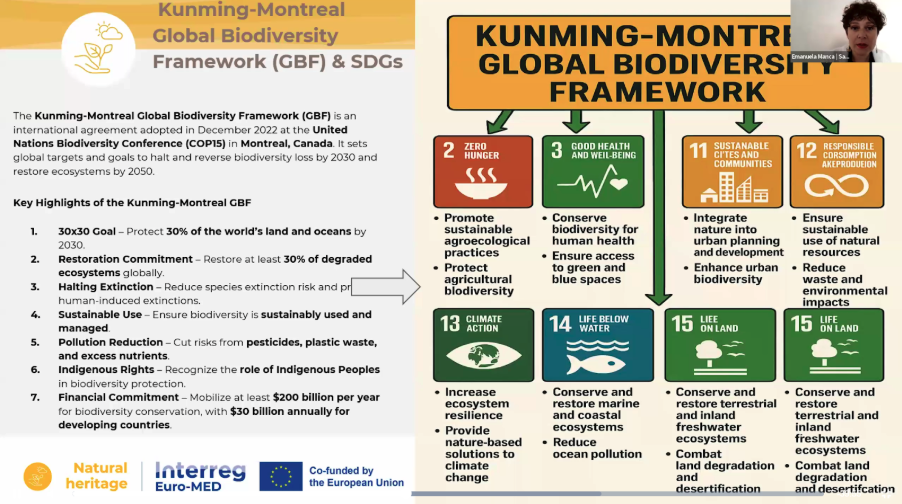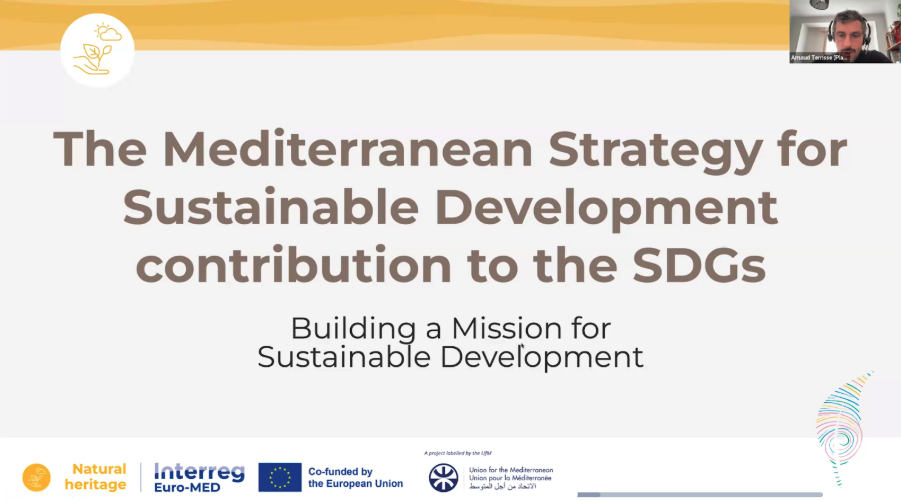On 3rd of April, the Mission for Natural Heritage took part in the United Nations Economic Commission for Europe (UNECE) Regional Forum on Sustainable Development, co-organising the webinar “Integrating Biodiversity and Governance: Building a Mission for Sustainable Development.”
The webinar highlighted successful integration of biodiversity and governance in Mediterranean initiatives, showcasing how local actions aligned with the SDGs —particularly through partnerships, coherent governance, and measurable impact. It reinforced the Mission for Natural Heritage’s role in driving sustainable development by linking regional strategies to global goals.
This session brought together actors working at the intersection of governance, biodiversity, and sustainable development in the Mediterranean to discuss how regional and local initiatives can contribute to the 2030 Agenda.
This session brought together actors working at the intersection of governance, biodiversity, and sustainable development in the Mediterranean to discuss how regional and local initiatives can contribute to the 2030 Agenda.
Aligning the Euro-MED Architecture with the SDGs
The webinar opened with the Interreg Euro-MED Joint Secretariat outlining how the programme architecture is strategically aligned with the Sustainable Development Goals (SDGs), especially those addressing climate action, biodiversity, and governance. The emphasis was placed on fostering synergies across objectives to build more resilient and sustainable Mediterranean territories. One example shared during the session showed how SDG integration is considered throughout the project cycle: from the initial design, where applicants are invited to indicate which SDGs their project supports, to the implementation and monitoring phases. Thematic projects, like COASTRUST, focus on concrete goals such as SDG 14 (Life Below Water), while governance projects develop tools to help identify and track these contributions using recognised indicators. This approach ensures that each project makes a meaningful contribution to the 2030 Agenda.
Grounding Global Goals in Local Action
The session continued with a presentation of the SDGs framework, highlighting how Mediterranean initiatives can contribute to global goals through locally grounded action. Particular attention was given to SDG 17 (Partnerships for the Goals), emphasising the role of cooperation among institutions, sectors, and borders. Biodiversity-related goals — SDG 14 (Life Below Water) and SDG 15 (Life on Land) — were also discussed, especially in the context of conservation, restoration and sustainable use of natural resources. Speakers stressed that achieving these goals requires coherent governance structures and strong stakeholder collaboration. They also pointed out the need for robust monitoring systems and shared methodologies to better measure progress and ensure alignment with both regional strategies and international frameworks.

An interactive SLIDO session engaged participants in mapping their own initiatives and values connected to the SDGs. Attendees were invited to reflect on what the Sustainable Development Goals represent to them, which local or regional initiatives they are familiar with, and which SDGs they associate most closely with the Mission for Natural Heritage. The session also asked which specific 2030 Agenda targets the Mission should consider when assessing its contributions. The responses revealed recurring themes such as cooperation, shared responsibility, and the importance of cross-sectoral partnerships — confirming the relevance of SDG 17 as a foundation for achieving broader sustainability goals.
Leveraging the Mediterranean Strategy for Sustainable Development
Participants were then introduced to the Mediterranean Strategy for Sustainable Development (MSSD), which offers a regionally adapted framework for implementing the SDGs. The presentation highlighted how the MSSD serves as a reference document for aligning national and local policies with global priorities, focusing on key areas such as climate finance, the circular economy, nature protection, and sustainable consumption and production. The strategy is currently under review, with updates aimed at improving policy coherence and strengthening the system of indicators used to track progress. Speakers also noted the role of the MSSD in supporting dialogue among Mediterranean countries and in bridging science, policy and practice.

Showcasing Projects Advancing the SDGs
A core part of the session was dedicated to showcasing the work of several projects within the Mission for Natural Heritage, illustrating how concrete actions across the region are advancing climate adaptation, biodiversity restoration, coastal resilience, and participatory governance — all contributing directly to the SDGs.
The projects presented and their associated SDGs include:
- ARTEMIS
→ SDG 11 · SDG 13 · SDG 14 · SDG 17 - Carbon4SoilQuality
→ SDG 11 · SDG 12 · SDG 13 · SDG 15 · SDG 17 - COASTRUST
→ SDG 13 · SDG 14 · SDG 15 · SDG 17 - FRED
→ SDG 11 · SDG 13 · SDG 15 · SDG 17 - Germ of Life
→ SDG 11 · SDG 13 · SDG 15 · SDG 17 - Greenlist4MPAs
→ SDG 11 · SDG 13 · SDG 14 · SDG 15 · SDG 17 - LocAll4Flood
→ SDG 11 · SDG 13 · SDG 17 - MedSeaRise
→ SDG 11 · SDG 13 · SDG 14 · SDG 15 · SDG 17 - MPA4Change
→ SDG 11 · SDG 13 · SDG 14 · SDG 15 · SDG 17 - StrategyMedFor
→ SDG 13 · SDG 15 · SDG 17 - TREASURE
→ SDG 6 · SDG 13 · SDG 14 · SDG 17 - WE GO COOP
→ SDG 11 · SDG 13 · SDG 17 - Wetland4Change
→ SDG 11 · SDG 13 · SDG 14 · SDG 15 · SDG 17
These thematic projects reflect the diversity of approaches within the Mission, while reinforcing the shared commitment to the 2030 Agenda.
The webinar affirmed that integrating biodiversity and governance is essential for sustainable development in the Mediterranean. By fostering cooperation, promoting coherent governance, and aligning local action with global priorities, the Mission for Natural Heritage exemplifies how targeted initiatives can accelerate progress towards the Sustainable Development Goals. As regional strategies evolve and partnerships deepen, the Mission stands as a catalyst for resilience, equity, and sustainability across the region.

